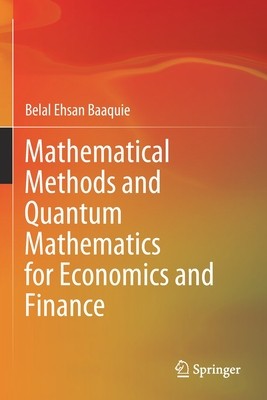
- We will send in 10–14 business days.
- Author: Belal Ehsan Baaquie
- Publisher: Springer
- ISBN-10: 9811566135
- ISBN-13: 9789811566134
- Format: 15.6 x 23.4 x 2.4 cm, softcover
- Language: English
- SAVE -10% with code: EXTRA
Mathematical Methods and Quantum Mathematics for Economics and Finance (e-book) (used book) | bookbook.eu
Reviews
Description
Given the rapid pace of development in economics and finance, a concise and up-to-date introduction to mathematical methods has become a prerequisite for all graduate students, even those not specializing in quantitative finance. This book offers an introductory text on mathematical methods for graduate students of economics and finance-and leading to the more advanced subject of quantum mathematics. The content is divided into five major sections: mathematical methods are covered in the first four sections, and can be taught in one semester. The book begins by focusing on the core subjects of linear algebra and calculus, before moving on to the more advanced topics of probability theory and stochastic calculus. Detailed derivations of the Black-Scholes and Merton equations are provided - in order to clarify the mathematical underpinnings of stochastic calculus. Each chapter of the first four sections includes a problem set, chiefly drawn from economics and finance. In turn, section five addresses quantum mathematics. The mathematical topics covered in the first four sections are sufficient for the study of quantum mathematics; Black-Scholes option theory and Merton's theory of corporate debt are among topics analyzed using quantum mathematics.
EXTRA 10 % discount with code: EXTRA
The promotion ends in 19d.21:32:47
The discount code is valid when purchasing from 10 €. Discounts do not stack.
- Author: Belal Ehsan Baaquie
- Publisher: Springer
- ISBN-10: 9811566135
- ISBN-13: 9789811566134
- Format: 15.6 x 23.4 x 2.4 cm, softcover
- Language: English English
Given the rapid pace of development in economics and finance, a concise and up-to-date introduction to mathematical methods has become a prerequisite for all graduate students, even those not specializing in quantitative finance. This book offers an introductory text on mathematical methods for graduate students of economics and finance-and leading to the more advanced subject of quantum mathematics. The content is divided into five major sections: mathematical methods are covered in the first four sections, and can be taught in one semester. The book begins by focusing on the core subjects of linear algebra and calculus, before moving on to the more advanced topics of probability theory and stochastic calculus. Detailed derivations of the Black-Scholes and Merton equations are provided - in order to clarify the mathematical underpinnings of stochastic calculus. Each chapter of the first four sections includes a problem set, chiefly drawn from economics and finance. In turn, section five addresses quantum mathematics. The mathematical topics covered in the first four sections are sufficient for the study of quantum mathematics; Black-Scholes option theory and Merton's theory of corporate debt are among topics analyzed using quantum mathematics.


Reviews